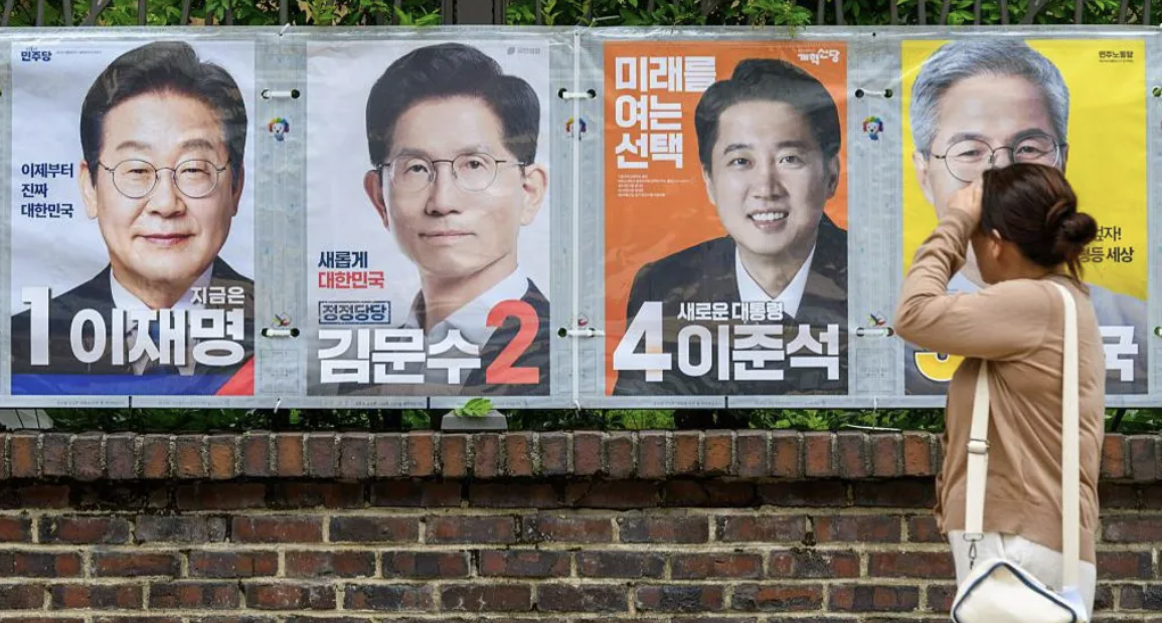

South Korea will elect a new president on 3 June to replace Yoon Suk Yeol, who was removed from office for placing the country under martial law for six hours in December.
The winner will be tasked with managing the political and economic fallout of Yoon's move, which plunged the country in deep turmoil and divided opinions.
The snap election is also being held as South Korea faces an unpredictable ally in US President Donald Trump - and that will shape long-running challenges such as the threat from North Korea, and Seoul's frosty relationship with China.
Here is what you need to know as the nation of about 52 million people chooses a new president who will lead it for the next five years.
Why is South Korea holding a presidential election?
Yoon was supposed to serve as president until 2027, but his term ended in disgrace.
He shocked the nation by declaring martial law on 3 December, citing threats from "anti-state forces" and North Korea - but it soon became clear that he was spurred by his own political troubles.
A week later, he was impeached by parliament. On 4 April, a constitutional court upheld his impeachment and removed him from office permanently, setting the stage for a snap presidential election within 60 days, as required by law.
In the six turbulent months since Yoon's martial law attempt, the country has had three acting presidents, the most recent being Lee Ju-ho, the labour minister who assumed the role one month before the election.
Lee replaced Prime Minister Han Duck Soo, who himself was impeached just weeks after taking over from Yoon as acting president. Finance minister Choi Sang-mok was acting president before Han was reinstated in March.
What are the big issues in South Korea's election?
Yoon's martial law laid bare the deep political divisions in the country, as those who supported his decision to impose martial law and those who opposed it took to the streets in protest.
The following months of uncertainty shook public confidence in South Korea's economy. And this was at a time when US President Donald Trump unleashed his tariffs on America's trading partners, with South Korean goods facing a 25% levy.
Closer to home, relations with North Korea are a persistent challenge. While 2025 has been relatively uneventful, the year before saw heightened tensions as Kim Jong Un escalated the rhetoric, and both sides spent months sending balloons and drones carrying propaganda materials across the border.
South Korea's new leader must also balance Seoul's relations between its biggest trading partner, Beijing, and its most important security ally, Washington.
Then there is the task of arresting the country's declining birth rate, which is among the lowest in the world - 0.75.
Who could the next South Korean president be?
Polls have placed Lee Jae-myung of the main opposition Democratic Party as the frontrunner among six candidates, followed by Kim Moon-soo from the ruling PPP.
Lee, who lost to Yoon by a razor-thin margin in 2022, is hailed by his supporters as a working class hero. He worked in a factory before he became a human rights lawyer and politician. He has promised to establish a "real Republic of Korea" with jobs and a fair society.
Kim, a former labour minister, has positioned himself as a president for the economy, promising to create a business-friendly environment.
The other candidates are Lee Jun-seok of the New Reform Party, Kwon Young-guk of the Democratic Labor Party and two independents - Hwang Kyo-ahn and Song Jin- ho.
For the first time in 18 years, there is no woman running for president. The first woman to run for president was Hong Suk-Ja in 1987, but she withdrew before the vote. The election in 2012 saw four female candidates contest for the top job.
When is election day and when are results announced?
The election is scheduled on 3 June and voting precincts will be open from 06:00 local time (22:00 GMT) to 20:00. South Koreans overseas were allowed to vote early from 20 to 25 May.
Results are expected to come in after polls close and the winner will likely be known in the early hours of the following day.
When Yoon defeated Lee in 2022, he was proclaimed the winner nine hours after the close of voting, or at 04:40 the morning after election day.
That was the closest presidential contest in the country's history, which saw Yoon win by a 0.73% difference in votes.
The new president will take office immediately and unlike many of his predecessors, will not have the advantage of a formal transition from Yoon.
What will happen to impeached former president Yoon Suk Yeol?
Yoon faces trial for an insurrection charge as a result of his attempt to impose martial law.
In January this year he became South Korea's first sitting president to be arrested after investigators scaled barricades and cut through barbed wire to take him into custody. He was relased from detention weeks later on a technicality.
He was also recently indicted for abuse of power, a separate charge to insurrection.
Before the election, Yoon quit his party in what analysts said was an attempt to shore up the chances of PPP's presidential candidate Kim Moon-soo.

















